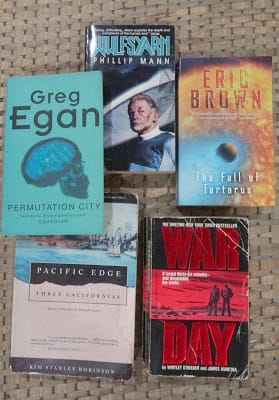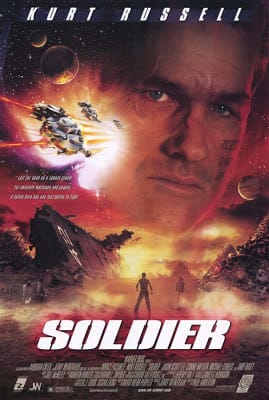Tag: Science Fiction
Five Desert Island Reads – Mike Dalke
1) The Fall of Tartarus by Eric Brown
Eric Brown writes amazingly humanistic science fiction and this novel was my first exposure to his work. The setting is on a planet soon to become engulfed by an expanding sun, so perhaps the constant heat depicted here may be a tad of a turn off, but the eight stories ooze a deep understanding of how humans confront loss and dying. So, for the sheer sake of experiencing empathy through a novel, The Fall of Tartarus is a must.
2) Warday by Whitley Strieber and James Kunetka
Again, maybe this type of trope is little depressing for a hermetic long-stay on a desert island, but it’s so very easy to lose yourself in the details of Warday. The journalistic details are captivating and the journey across the states in search of additional facts and how fellow Americans are dealing with the effects of nuclear disaster is, again, humanistic in nature.
3) Three Californias: Pacific Edge by Kim Stanley Robinson
The Three Californias series isn’t a well-known KSR work, but they each exhibit a clear projection for the possible future of the state of California. Pacific Edge is a notable book in my 450 book library because it contains the one character I ever fell in love with–Ramona. For the sake of experiencing Ramona through the eyes of her young love Kev, this book must be by my side.
4) Permutation City by Greg Egan
Not humanistic whatsoever, but it’s one of those books which really blow your mind. The depth of complexity and extra-corporeality sets my mind tingling. I think this kind of distraction would trump the mundaneness of coconuts and crabs.
5) Wulfsyarn by Phillip Mann
This just may be the crème de la crème of humanistic science fiction, watching through the eye of an “autoscribe” as it reconstructs the story of how a captain lost his entire crew on its maiden voyage. The grassroots feel to the novel tugs as the heart strings as the reader vicariously experiences the rise and fall of the great Captain Wilberfoss.
Pirates
Interesting. There’s been lots of discussion here and elsewhere about E-books, pirates and DRM. Whenever I go ego searching I’m often coming across sites where my books can be downloaded, but often no sign of how they are to be paid for. Thus far I’ve had three people contact me to tell me how much they’ve enjoyed the books but, ahem, they didn’t pay for them. A recent email was from someone in Japan who finds it difficult to get hold of my E-books legally but wanted to contribute. He sent me $50 by Paypal and, at his suggestion, I’ve now put up a donate button on the right here for those who have downloaded my books illegally but feel the need to salve their consciences.
![]()
Jawing
Counting Words
Just recently another writer said how he just can’t write like that – he has to wait for inspiration. I have heard this from other writers too and have no time for it. During the week my inspiration clocks in at 8.00 in the morning and is allowed to go at 5.00 in the evening, unless there’s overtime. It helps me with 2,000 words in that time unless there’s editing to do. It gets quite a lot of time off and holidays, but when it’s time to work it is not allowed to whine, mope about or skive off. Inspiration, I have to say, is a lazy and fickle thing often in need of a good kick up the arse.
Soldier – Kurt Russell
This is well worth watching, in my opinion. Screw the negative reviews.
Workshop
Continuity
Writing Update.
The Great Stagnation
This is why you see no technological singularity in The Departure – the parasitic state has killed innovation and invention. My only hope, in the real world, is that the financial collapse we are entering now will kill off some portion of the parasite infestation before the host dies. But even if that does happen, the host will still need time to recover its health, and the problem is that parasites grow faster than their hosts.




